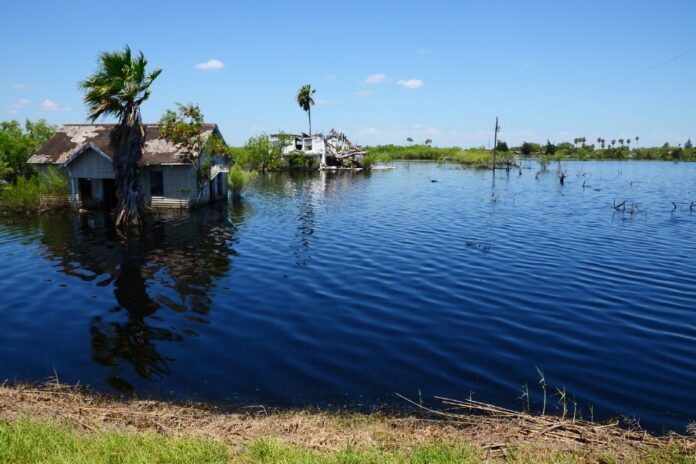HARLINGEN — Since the flooding in June in Cameron, Willacy and Hidalgo counties, many residents have yet to find the end to their home repair issues.
However, FEMA continues to attempt to reach as many victims as possible and provide as many grants and assistance as needed, according to La-Tanga Hopes, an agency public information officer.
Many of the flooding victims who have applied for government help have received a letter or an email saying their application has been denied. But Federal Emergency Management Agency representatives say they should not get discouraged and should continue to try to receive assistance by appealing their case.
“Many people could be getting ineligibility letters depending on who inspected their homes. But we encourage them to call the assistance number or come to the Disaster Assistance Center and ask to speak to someone in legal services,” Hopes said.
“Once they review why their case was denied and they have all the documentation required, they should appeal and not be alarmed,” she said.
Several Harlingen residents have already received an ineligibility letter or email.
One of them is Yuridiana Colorado, who lives on Wilson Road in Harlingen. She received an email saying she did not qualify for assistance after an inspector visited her trailer home.
“My house did not get flooded that badly but the insulation foam got messed up. Since it didn’t get flooded as badly as others, the inspector said it was habitable,” Colorado said.
“My neighbors did get approved, and their inspectors checked every single room in their homes and mine did not, which I thought he should have done,” she said.
Colorado will be submitting an appeal and was told to write a letter and get someone else to inspect her home and give her an estimate.
Johnny Rodriguez and Paula Landaverde, also from Harlingen, were told their homes were livable as well by the inspector sent to them.
“My children are not able to sleep in their own room. One is currently sleeping in the living room because of the mold that is there,” Rodriguez said.
Rodriguez is also attempting to appeal and have someone take another look at his home damages.
Landaverde said she felt discouraged to continue the process, but remains hopeful they will help her. Her house and her vehicle were ruined by the flooding.
“I am tired of all the documentation they ask for and having to re-apply when my house is clearly damaged. But hopefully, they do help us,” she said.
ASSISTANCE FOR UNDOCUMENTED FAMILIES
The status of a qualified resident includes:
• Legal permanent residents (those with Green Cards)
• Those with refugee or asylum status
• Those whose deportation has been withheld
• Those on parole in the U.S. for at least one year for humanitarian purposes
• Those with conditional entry
• Those who are Cuban-Haitian entrants
• Those with petitions for relief based on battery or extreme cruelty by a family member
FEMA is not only encouraging flood victims to re-submit their applications but representatives also want non-U.S. citizens to know they may be able to receive funding as well.
Undocumented families with diverse immigration status only need one family member (including minor children) who is a citizen and has a Social Security number to apply.
The minor must live with the parent or guardian applying on his/her behalf.
Disaster victims will be asked to sign the Declaration and Release Form stating that they are among the qualified applicants. If an individual is not able to sign the Declaration and Release Form but has a minor child who is a U.S. citizen or a qualified resident residing within their household, they can still apply for assistance on the child’s behalf and no information regarding their status will be gathered.
Additional assistance may be available regardless of citizenship status.
Other individual assistance programs such as Crisis Counseling, Disaster Legal Services and other short-term, non-cash emergency assistance, such as congregate shelters, are available to an individual or family regardless of citizenship status. Additionally, voluntary agencies provide help regardless of citizenship or immigration status.
What You Should Know
Eligibility
A letter sent by FEMA may explain why an applicant is deemed “ineligible” and what needs to be submitted, if applicable.
Documents needed
• Proof of identification
• Insurance determination regarding what amount insurance will pay for damaged or destroyed property
• Proof of occupancy or ownership of the damaged or destroyed property
Residents have 60 days to make their appeal from the date of the FEMA letter.
Applicants who have questions about the letter may go online to www.DisasterAssistance.gov; or call the Disaster Assistance Helpline at 1-800-621-3362 (TTY 1-800-462-7585)
They can also access the FEMA app for smart phones www.fema.gov/mobile-app; or visit the Disaster Recovery Center (DRC) in the La Feria Safe Room Dome at 1001 Pancho Maples Drive.
Residents going to the safe room should bring their “denial” letter, along with the additional information requested.
It is currently open seven days a week from 7 a.m. to 7 pm.




